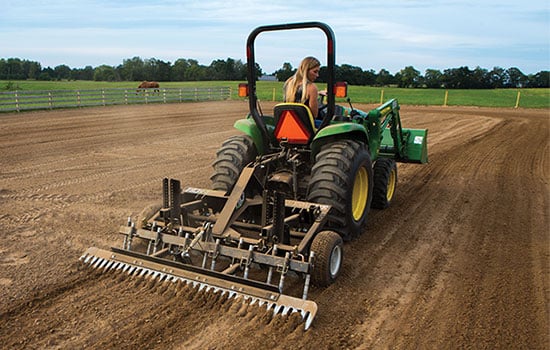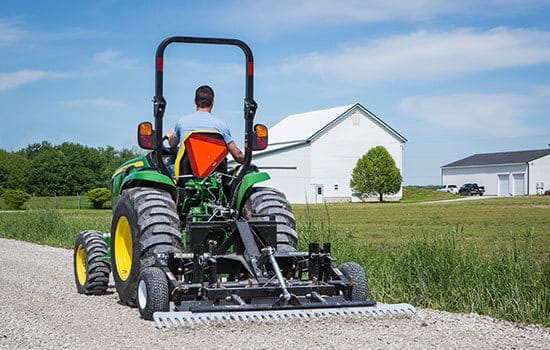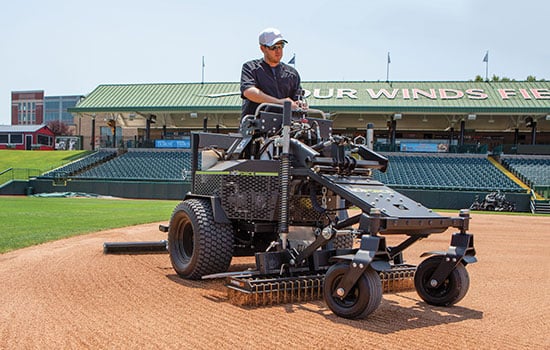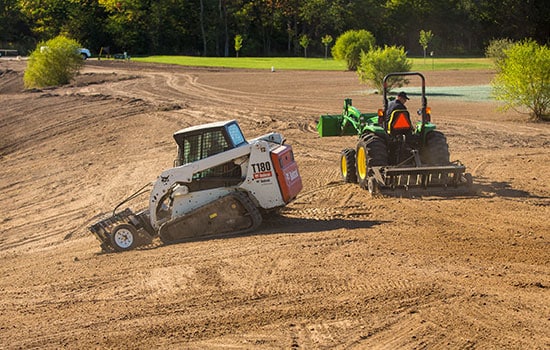PTO Classic Manure Spreader – Product Details – By ABI
Transcript
Hello, my name is Scott Holmes and I’m the Executive Vice President at ABI. Thank you for your interest in the ABI Classic Spreaders. The most well designed, durable and long lasting spreaders in the market today. In order to introduce you to the PTO version of the ABI classic spreader. I’m going to take you to a White Booth video that introduces you to this product feature by feature and point by point. And I know that at the end of this video, you will also believe, as I do, that this is the most well-built spreader in the world.
First, let’s cover the overall construction of the ABI spreaders. Now today, you’re looking at an eighty five cubic foot PTO driven ABI Classic Spreader. Our PTO spreaders come in a range from 50 cubic foot to one hundred and thirty cubic foot. And today you’re looking at the eighty five cubic foot.
The ABI spreader line is made out of Cor-10 steel and Cor-10 steel is a major feature and benefit that only ABI is using in the construction of our manure spreaders. Most of our competitors are using a mild steel. A lower grade steel are they’re using galvanized steel to prevent rust and corrosion. And that is a very important thing. When buying a manure spreader, we know that the number one thing that you’re concerned about is the corrosion and the rusting of the box. Those competitors who are using galvanized steel are solving the one problem, but creating another problem. You see, galvanized steel will eliminate rust and corrosion, but it is toxic to weld on, and therefore, these companies who are using galvanized steel for their for their boxes are having to bolt together the frames and bolt together their boxes. You’re eliminating the rust and corrosion, which you’re creating a weaker product and a product that will break down in the field.
ABI has solved both problems by using Cor-10 steel, which is a weathering steel steel that will eliminate and not allow rust to go through and errode away the box and yet can be welded on, we were able to have a completely welded frame, welded tongue and a steel material that prohibits rust and corrosion.
When I say that the ABI classic spreader is 100 percent welded. I’m including the A-frame hitch. The hitch that connects to your tow vehicle. In the compact manure spreader market, nobody is welding the hitch to the frame. They’re bolting and in fact, in a lot of cases they’re using just a single tube that comes out the center and drop pins in. The problem with not welding your hitch to the frame is that all the torque and tug from the use in the field is on the hitch, not on the strongest part of the spreader, which is the box, the main frame. ABI welds the hedge right to the main frame to get the maximum amount of strength and durability. This just makes for a long lasting life when it comes to the frame and the hitch of the ABI Classic Spreaders. Every ABI Classic Spreader comes with a swing away jack that is attached to the A-frame the hookup of the spreader. This allows you to keep the tongue in place for easy connection and unhooking of the manure spreader.
In order to use the PTO version of the ABI Classic Spreader, your tractor must have a five hundred and forty RPM PTO or power takeoff shaft. In order to properly use the PTO version of the classic spreader. You need to have your tractors PTO lever all the way open, full throttle and then you have a adjustable rope that allows you to adjust the speed of the conveyor or the apron chain. This rope allows and this machine gives you seven different speeds to move them in or back towards the shredder bar and the beater bars.
So why a PTO version? Why not the ground drive versions that ABI has to offer? Well, PTO gives you as an operator a few benefits that the ground drive does not. For one, you’re able to handle a heavier and more dense load. You’re not relying on the ground contact of the tires to evenly spread the manure. The PTO will be more evenly spread and consistently spread your manure. So you have a much heavier duty, more durable way of spreading the manure.
Secondly, the tires on the PTO spreader are less aggressive on the pastures. They float a little bit more because there’s no need for traction. There’s no need from grip in order to turn the mechanisms. All the mechanisms are being driven from the PTO, not from the ground drive tires.
One of the biggest benefits of having a PTO version of a spreader is that you can load up your manure spreader, back it up to a compost pile and turn it on. Now the manure spreader will top up and spread your manure and spray it into your pile, which gives your manure a head start on the decomposition.
Before we get to the inside of the spreader. The inside mechanisms that move the manure back and out onto your pasture. Let’s talk about the box of the ABI Classic Spreader. The ABI Classic Spreader box is made with flared sides and the primary purpose of this is to allow you to mound up your manure and to allow it to settle in and stay inside the box. Without flared size, the manure tends to fall over the sides. And this makes for easier front end loading of the manure into the box.
One of the options that you’re not seeing on this display model is our endgate, a gate that connects into the middle of the box, folds back and blocks the manure from coming out the back when in transport. On the models that are this size and larger, they’re hydraulically controlled endgates and on the 50 cubic foot. It’s a manual and gate. And of course, don’t forget that the box is made up of 12 gage Cor-10 steel. Remember, and I will talk more about this in a minute about the importance of corrosion and rust resistance. The Cor-10 steel and the thickness of the steel is a perfect combination too, to resist corrosion and rust.
Now, when it comes to the inside of the box of the ABI Classic Spreader. Let’s start with the apron chain on the conveyor. Our chain is a t-rod design. Now, a t-rod design is four times stronger than the traditional chain that has been commonly used in manure spreaders. One of the biggest problems with manure spreaders is when you have a heavy load, a wet load or very dense load, the chains tend to stretch in and break. The t-rod design is four times stronger, giving you a much longer lasting life and less breakdown in the pasture.
Now, at the front of the spreader, there are some tension controls where you can adjust the tension of the apron chain and the t-rod chain to give you the flexibility to adjust the manure spreader the way you need it to operate.
As the apron chain is moving the manure back towards the back of the spreader, and prior to being flung into the pasture with the widespread beater bars, the manure is going through a process of chopping and shredding to give you a shredded output. On the ABI Classic Spreader, on this one, you are going to see two shredder bars that have 100 blades on it that will chop and dice up your manure and straw. Giving you a shredded output. Now, why is a shredded output important? Because at ABI, we fundamentally believe that you need to have a shredded manure and a very fine manure to put on your pasture. You want the U.V. rays of the sun to break that manure down quickly so you can turn your pastures faster. If you’re using a manure spreader that doesn’t put the manure through a shredding process before throwing the clumps out into the field, then the large clumps of manure are going to do two things. One, they prohibit the U.V. rays from breaking down the manure quickly, which then burns your pastor too much nitrogen for too long will burn your pasture. The second thing it does is it creates a bed for flies and larvae. So it’s an unhealthy environment. And it burns up your pasture. ABI fundamentally believes you need to spread the manure before putting it onto your pasture. And every one of our ABI Classic Spreaders has a significant shredding process and shredding bars to give you a shredded output.
Once the manure has been properly shredded, the shredded bars will feed the manure into our widespread, specifically designed and engineered beater bar. This beater bar will evenly spread the manure on the pasture, giving you a less chance of burning the pasture by leaving large clumps behind it. It’s important for you to know that the shredder bar and the beater bar actually run at different speeds. There’s more power to the shredder bar and more speed to the widespread beater bar. This gives the shredded bar more power to chew up and dice up the manure and the straw and more speed to the beater bar to spread it out wider and more evenly.
To further prevent corrosion and rust, the inside of the box is sprayed with a coal tar epoxy box liner. This box liner is ideally suited for the unique demands of a manure spreader. Coal tar epoxy offers great flex, so it is perfectly suited to expand a contract with climate and can handle the abrasion and acidity of the manure flowing through the spreader. Coal tar epoxies are famous for protection from moisture and are commonly used on garage floors, underground pipelines, tanks, even the holes in barges. The benefit of this box liner is to further prevent corrosion. The floor of the ABI Classic Spreader box is not steel and it’s not wood, it’s plastic. The floor is constructed of a tongue and groove poly lumber so it will never rot or rust. Even better yet, the tongue and groove construction prohibits the individual poly boards that make up the floor from warping. That would cause the web to get caught and bind on the floor. This is a premium maintenance free flooring that will last a lifetime. We guarantee it.
Corrosion and rust resistance is a primary concern when buying manure spreader and ABI does not take the problem lightly. We’ve implemented a five step process to help prevent corrosion and rust.
Number one, we start with a corrosion resistant Cor-10 steel. Then all steel components are sandblasted before painting. This cleans the impurities off the steel and opens the pores to absorb the paint for the best bond. Then a Rust-Oleum stop-rust paint is applied. This paint is easy to repair and touch up. And unlike powder coating moisture, can I get behind the paint to rust from the underside. Our fourth step is a coal tar epoxy box liner that is applied inside the box. And finally, a tongue and groove poly plastic lumber floor will not rust, corrode or rot. This floor has a limited Lifetime warranty.
I’m sure by now that you understand that the quality design and durability of the ABI Classic Spreader is second to none and all for a comparable price. So how do you get one of your very own? How do you put one of these machines into your operation? Well, ABI sells direct to you. The end user. We don’t markup for a middleman. We don’t have dealers nationwide. We deliver right to your doorstep. So we need to ask you a series of questions about your tractor, tow vehicle, what your needs are, how often you spread and what kind of features you want on your manure spreader.
So call our toll free number at 877-788-7253 and speak with one of our qualified equipment specialists. They’re going to share with you about our 30 day money back guarantee and our financing options to make the purchase of an ABI Classic Spreader easy for you.



